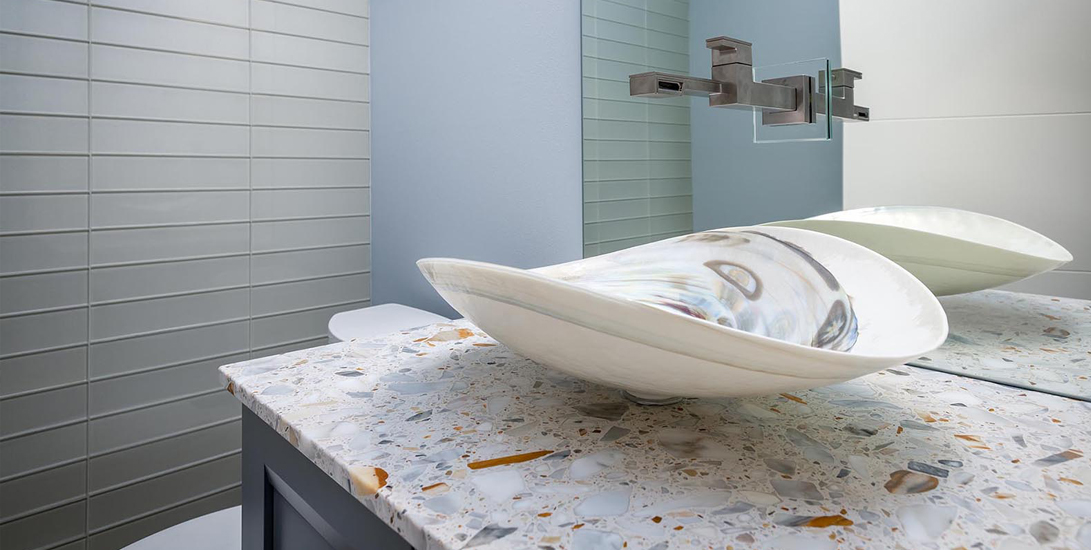Cleaning with Essential Oils: Benefits Backed by Science and a Commitment to a Healthy Home
At Inspire Homes, we care about both your health and the efficiency of your home. A clean, healthy living environment plays a vital role in your overall well-being, and that’s why we prioritize creating spaces that are designed for comfort, air quality, and long-term savings. Essential oils can be an effective, natural addition to your cleaning routine, providing both antibacterial properties and fresh scents without harsh chemicals. Here’s how essential oils can contribute to a healthier home, backed by scientific evidence.
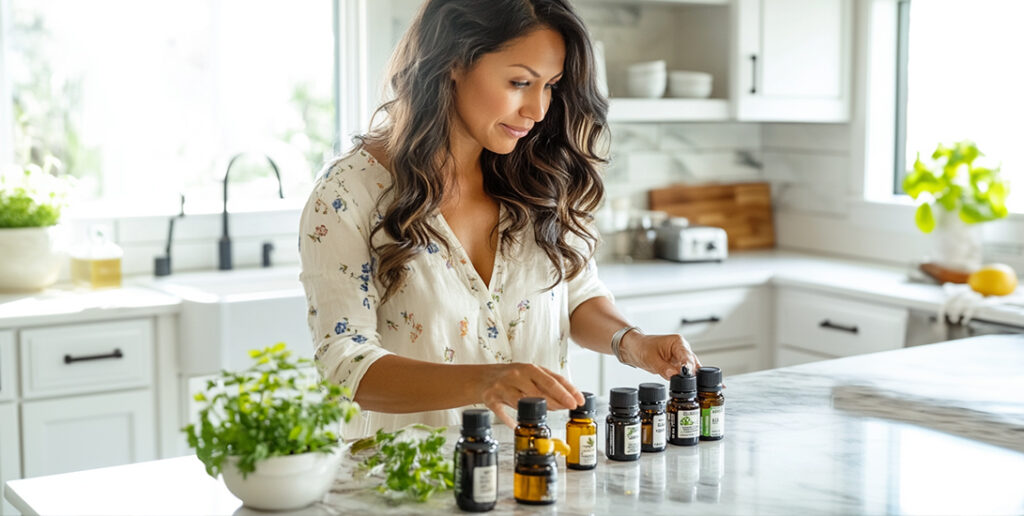
1. Lemon Essential Oil: A Natural Degreaser
Lemon oil is a natural powerhouse, known for its ability to break down grease and grime. Its secret weapon, d-limonene, is not only a potent degreaser but also exhibits antimicrobial properties. Studies show that d-limonene can reduce bacterial growth by over 99%, including harmful strains like Salmonella and E. coli, making it especially useful for cleaning kitchens1. The fresh, citrusy scent also offers mood-boosting effects, creating a clean and uplifting environment.
How to use it
- Add a few drops to water and vinegar to create an all-purpose cleaner.
- Use it in dish soap to boost grease-cutting power.
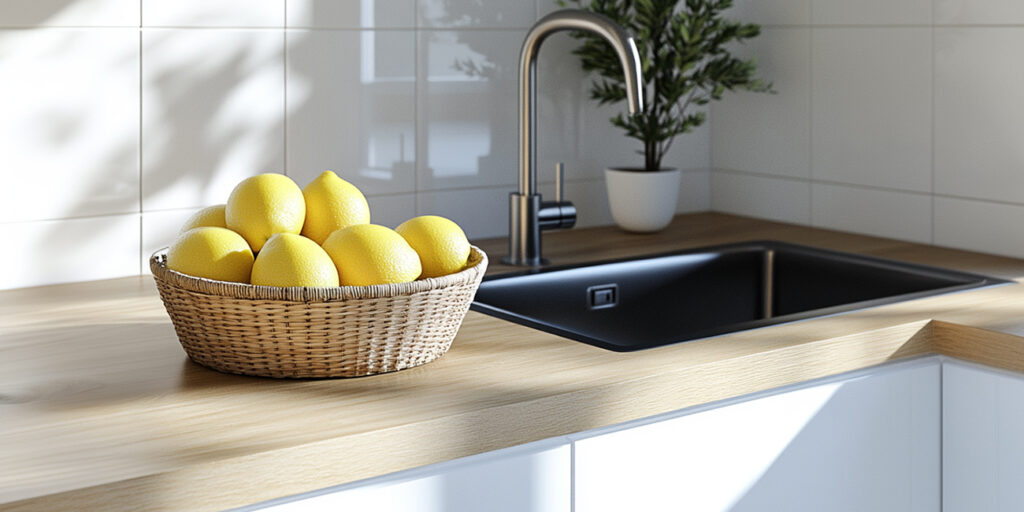
2. Tea Tree Oil: Antimicrobial Action
Tea tree oil has long been recognized for its antibacterial, antiviral, and antifungal properties. Research shows it’s effective against a wide range of pathogens, including Staphylococcus aureus and Escherichia coli2. Tea tree oil is a natural disinfectant that can be used to clean high-touch areas in your home, reducing bacteria without harsh chemicals. Its natural, non-toxic nature also means it’s safe for homes with kids and pets, while still providing powerful germ-fighting benefits.
How to use it
- Combine it with water and vinegar to disinfect high-touch areas.
- Use it in bathroom cleaners to prevent mold and mildew.
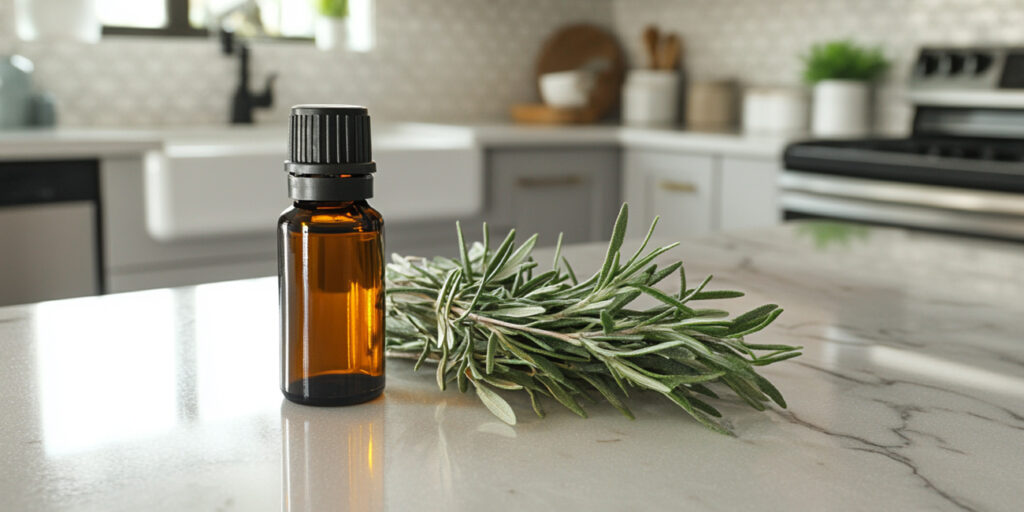
3. Lavender Oil: A Gentle Antibacterial Agent
Lavender oil not only smells wonderful but also packs a dual punch of stress-relief and antibacterial action. In fact, studies show that lavender oil can reduce anxiety levels by up to 50%3. This calming effect makes it perfect for use in bedrooms and relaxation spaces. Beyond its soothing properties, lavender is also antibacterial. Studies have shown it can inhibit the growth of Streptococcus and E. coli4, making it an ideal natural cleaner for maintaining a safe and serene environment for the whole family.
How to use it
- Add it to water and baking soda for cleaning dust and surfaces.
- Mix with mild soap to clean toys or pet areas.
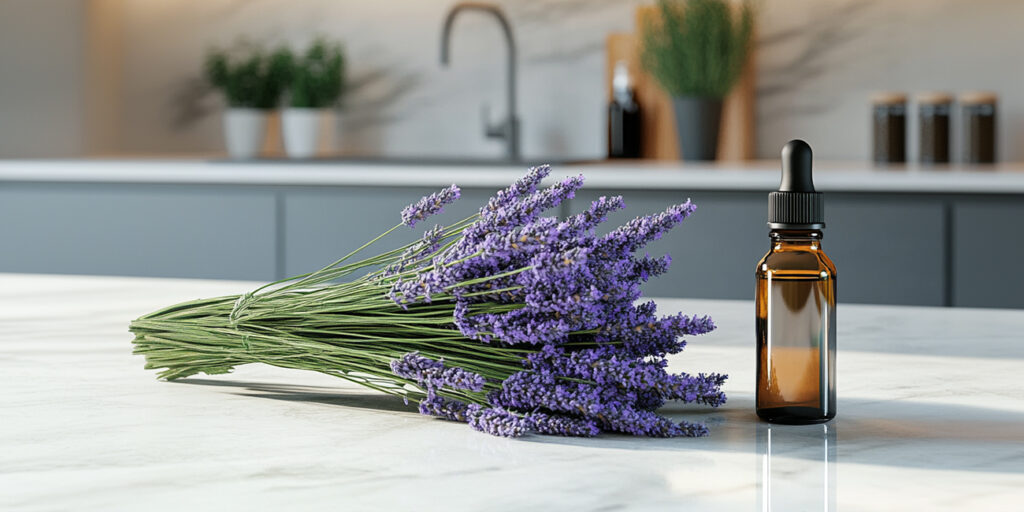
4. Eucalyptus Oil: Air Purifier and Antibacterial
Eucalyptus oil is a fantastic option for fighting bacteria and mold, particularly in damp spaces like bathrooms. Its antifungal properties make it highly effective in controlling mold spores, such as Aspergillus and Penicillium5. In addition, eucalyptus oil can purify the air by killing airborne pathogens, offering both cleanliness and freshness. A clean bathroom isn’t just about appearance—it’s about ensuring the space is free of bacteria, mold, and even respiratory irritants.
How to use it
- Use in a diffuser to improve air quality in mold-prone areas.
- Add it to water and vinegar for cleaning tiles and floors.
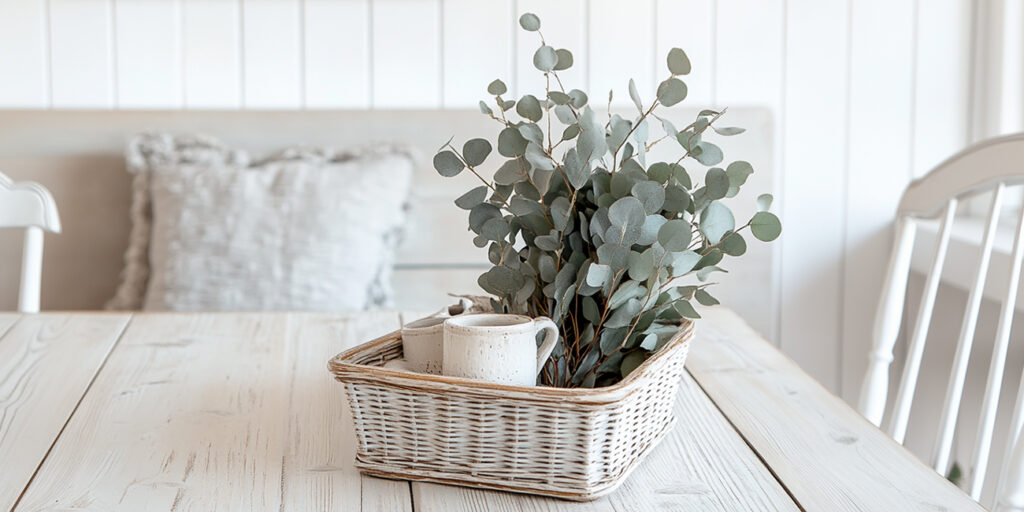
5. Peppermint Oil: A Natural Pest Repellent
Peppermint oil is more than just a refreshing scent—it’s also a natural deterrent for pests like ants, spiders, and mice. A study found that peppermint oil can reduce pest activity by up to 75%, making it an effective, chemical-free solution6. Its menthol component interferes with pests’ sensory receptors, driving them away from your home. Additionally, peppermint’s antibacterial properties can also help keep surfaces free of germs, making it a multipurpose solution for maintaining both cleanliness and pest control.
How to use it
- Mix with water and spray around windows and doors to repel pests.
- Use in storage areas to protect your pantry from insects.
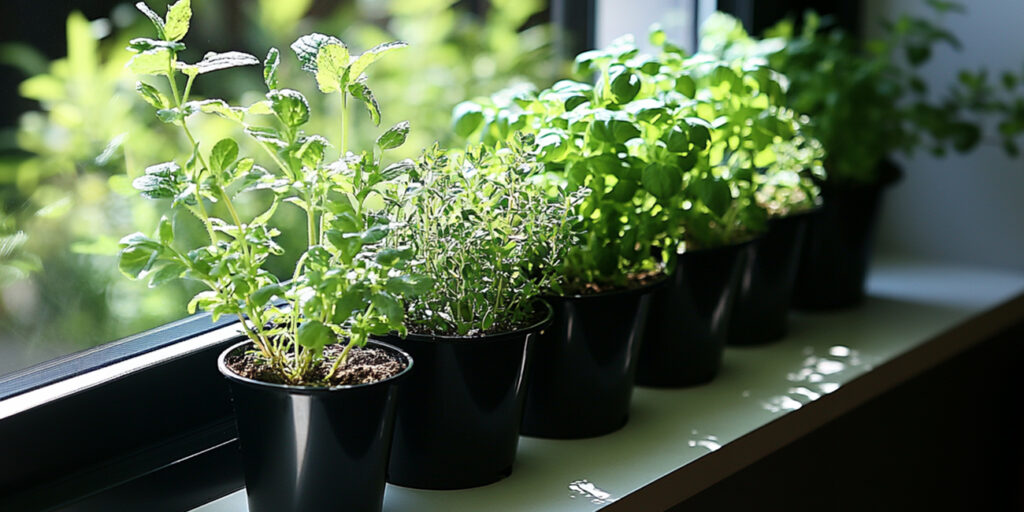
6. Simple Essential Oil Cleaner Recipe
Ingredients:
- 2 cups distilled water
- 1 tablespoon baking soda (optional for added cleaning power)
- 10 drops lemon oil (degreaser and antibacterial)
- 10 drops tea tree oil (disinfectant)
- 5 drops lavender oil (antibacterial and calming)
- 5 drops eucalyptus oil (antibacterial and mold fighter)
Instructions:
- Combine the water and baking soda (if using) in a spray bottle.
- Add the essential oils.
- Shake well before each use.
- Spray on surfaces and wipe clean.
This solution is safe for most surfaces and leaves a fresh, natural scent!
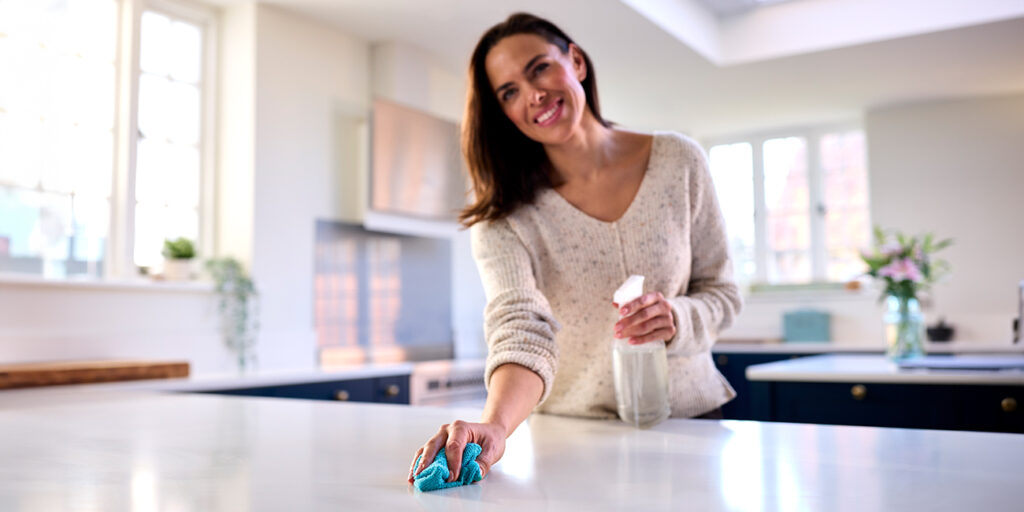
Final Thoughts
At Inspire Homes, we go beyond surface-level cleanliness to ensure your home is truly healthy. Our focus on energy efficiency, indoor air quality, and the use of non-toxic materials like low-VOC paints, and proper ventilation reduces exposure to allergens and improves overall well-being. We design homes that are not only beautiful but support both your physical and mental health. Incorporating essential oils into your cleaning routine is just one way to enhance the quality of your indoor environment.
Cleaning with essential oils offers a natural alternative to chemical-laden cleaners while also providing scientifically supported benefits. From cutting grease with lemon oil to fighting bacteria with tea tree oil, essential oils can play an effective role in maintaining a clean and healthy home. Remember to always dilute essential oils before use, as their concentrated forms can sometimes cause skin irritation or damage surfaces. For best results, pair these natural options with traditional cleaning methods to strike the perfect balance between cleanliness and safety.
By integrating essential oils into your cleaning routine, you can harness their natural power to keep your home fresh, clean, and free from harsh chemicals.

SOURCES
-
-
Journal of Applied Microbiology, study on the antimicrobial activity of d-limonene. ↩
-
Clinical Microbiology Reviews, research on the antimicrobial properties of tea tree oil. ↩
-
International Journal of Psychiatry in Clinical Practice, study on lavender oil’s effect on anxiety reduction. ↩
-
Journal of Medical Microbiology, lavender oil’s antibacterial efficacy against common bacteria. ↩
-
International Journal of Food Microbiology, study on eucalyptus oil’s antifungal effects against molds. ↩
-
Journal of Pest Management Science, research on peppermint oil’s effectiveness as a pest deterrent. ↩
-
- 9.2 min read
How to Choose the Best Paint Colors for Your New Home When building a custom home with Inspire Homes, one of the most transformative design choices we make is selecting [...]
- 5.8 min read
The Ultimate Guide to Building a Modern Contemporary Home Imagine a home that feels just right, every single day. Not just when you first get the keys, but for years [...]
- 3.7 min read
2025’s Latest Master Bathroom Trends and Must-Haves Your master bathroom is more than just a functional space—it’s your personal retreat, a place where style and comfort should meet seamlessly. At [...]





